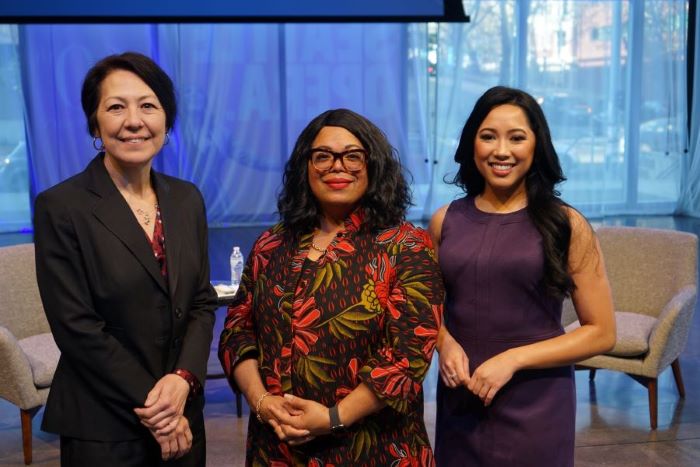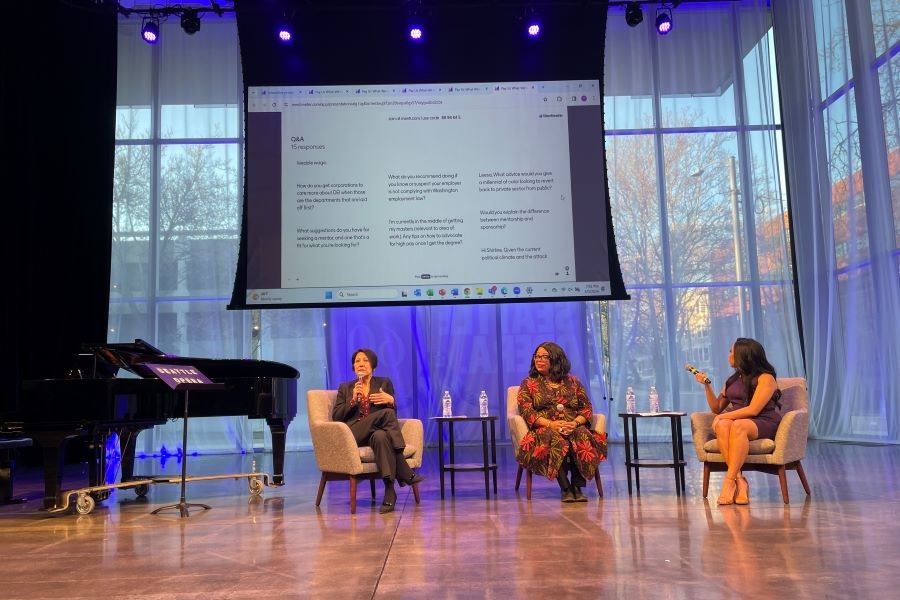Get Paid What You’re Worth!
This blog post was written by Kayla J. Dunn, United Way of King County editorial associate.
On Wednesday evening, the Seattle Opera buzzed with voices and energy—but few of those voices were classically trained sopranos.
About 70 people came together in the Opera’s McCaw Hall for United Way of King County’s Pay Us What We’re Worth event, hosted in collaboration with eight organizations, several of which were local young professional networks.
The event offered everything young professionals need to succeed: a station for professional headshots, networking opportunities, and applicable advice from some of the state’s foremost female leaders of color.
Starla Sampaco, a Forbes columnist and former KCTS anchor, moderated the conversation between Shirline Wilson and Leesa Manion about salary negotiation, workplace conduct, and pay inequity.
Wilson is the executive director of Washington Employers for Racial Equity, an organization dedicated to working on systems change with major statewide companies to close the pay equity gap. Manion is King County’s prosecuting attorney—the first woman, the first person of color, and the first Asian to serve in the role.
“This is the next generation of community executives, learning from one another here,” said Isabelle teDuits, an events and program specialist for the Seattle Metro Chamber of Commerce. “I’m so grateful to be able to work with these other groups, utilize our resources, and bring together a great panel of brilliant people to learn from.”
The event kicked off with two stunning opera songs, and then panelists took the stage.

“We have inherited a racist system,” Manion began. She shared that in her time as prosecuting attorney, she had worked to adjust 40 inequitable employee salaries. As a woman of color, fixing past inequities was a priority, but the same is not true for all employers.
“The best time to negotiate is at the job offer,” Wilson said. Then, she and the panelists outlined the negotiation process:
First, Wilson said, gather data on your position and understand your realistic asking range. Do the research, the panelists encouraged. Ask yourself questions like how much similar positions make in King County. Do those salaries vary between genders and races? What is the industry standard? Know your stuff before stepping into the bargaining room.
Second, the panelists encouraged the audience to negotiate with a friend or on camera.
“Roleplay the negotiations,” Manion emphasized. She and the other panelists said that if you would prepare for an interview, you should prepare for the negotiations, too. Pay attention to your body language and the tone of your voice. And when it comes to the negotiation, let the employer propose the salary first and then go up from there.
Third, the panelists said that job seekers should understand that there’s more to your contract than a salary. If the pay is not negotiable, then get creative, they said. Stocks, opportunities, visibility, or a seat at a certain table may be valuable bargaining chips.
Sampaco shared that in her salary negotiations when entering education, she bargained for visibility opportunities that helped spur her work in public speaking. Think long-term about what you want to walk away from this job knowing or having done.
“If it’s easier, pretend a trusted friend or family member is describing what you do well. How would they speak about you?”
Leesa Manion, King County prosecuting attorney
Fourth, the panelists said that jobseekers should review their accomplishments, adding that the job search is not the time to be humble. All three speakers urged audience members to keep a folder on their computer of their accomplishments. Include projects you’ve completed, roles you’ve filled, and screenshots of compliments from your previous coworkers and superiors. Before the negotiation, review your folder. Practice talking about yourself and describing what you do well.
“If it’s easier, pretend a trusted friend or family member is describing what you do well,” Manion said. “How would they speak about you?”
Lastly, the panelists said to know when to walk away: If the job’s not a good fit, don’t force it, and don’t settle for less than you’re worth.
Sampaco cited an article stating that improper salary negotiations could cost you $1 million over the course of your career. It’s critical to advocate for yourself.
“But maybe you’re in a place where you have to take a lower-paying job,” Manion acquiesced. “If it’s a good step toward where you want to be and you have a plan, don’t let (accepting the job) turn into shame.”
Spliced between salary negotiation talks, the trio also touched on the importance of finding a mentor or sponsor, speaking with a financial planner, and remembering your worth.
“I’ve met many women and people of color in academia and journalism who stayed in low-paying positions because they believed in their work,” Sampaco said. “Don’t give into the spirit that (leaving is) selling out. It’s really hard to thrive when you can’t pay the bills to survive.”
“And this is not your parents’ generation,” Wilson reiterated. “People aren’t staying at jobs for 10 to 13 years. Think about your career as a portfolio.”
Wilson and Sampaco also encouraged the audience to maintain a backup plan or side hustle because “no job is truly stable.” But more than anything, the speakers emphasized that the foundation of salary negotiation is confidence and self-advocacy.
“Self-advocacy starts to break down when you stop believing in yourself,” Manion said. “Choose who you listen to and listen to people who believe in you.”
“Confidence is a journey, and it comes from clarity on what you bring to the table. Know yourself,” Manion continued.
Sampaco concluded, “And instead of ‘work hard and put your head down,’ work hard and tell people about it.”



Comments